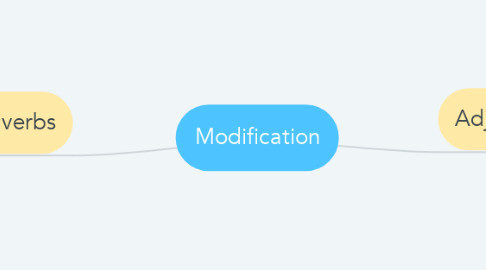
1. Adjectives
1.1. Recall
1.1.1. The English adjective is invariable; it does not agree with the noun either in gender or in number.
1.1.2. It is placed before a name that will qualify.
1.1.3. When two or more adjectives precede a noun, they can be connected by the conjunction "and", or by a simple comma.
1.2. Types
1.2.1. Importance
1.2.1.1. important, significant, crucial...
1.2.1.1.1. What Bachelard wrote in 1934 is still relevant to comtemporary scientific problems.
1.2.2. Dimension
1.2.2.1. enormous, huge, tiny...
1.2.2.1.1. Blood plasma contains minute quantities of creatinine.
1.2.3. Hierarchy
1.2.3.1. major, minor, main...
1.2.3.1.1. Little by little the patient's condition worsened.
1.2.4. Intensity
1.2.4.1. dramatic, acute, steep...
1.2.4.1.1. There has been a sharp decline in the quality of river water.
1.2.5. Amplitude and utility
1.2.5.1. suitable, useful, efficient...
1.2.5.1.1. If electromgnetic radiation of suitable wavelength falls upon the metal, electrons are ejected.
1.3. Definitions
1.3.1. A word that can accompany a noun with which it agrees in gender and number, and that is not an article
2. Adverbs
2.1. Recall
2.1.1. Adverbs are placed, like adjectives, before the object they qualify.
2.1.2. Formation
2.1.2.1. Many adverbs of manner or degree are formed by adding the suffix [-ly] to the corresponding adjectives
2.1.2.1.1. Immediate -> immediately
2.1.2.1.2. Final -> finally
2.1.3. Transformation
2.1.3.1. -y ->i
2.1.3.1.1. happy -> happily
2.1.3.2. -e -> garde -le
2.1.3.2.1. extreme -> extremely
2.2. Types
2.2.1. Essence
2.2.1.1. essentially, fundamentally, on the whole...
2.2.1.1.1. Basically, there is little difference between the two processus.
2.2.2. Manner
2.2.2.1. carefully, accurately, properly...
2.2.2.1.1. The 1st law of thermodynamics was not properly formulated until the middle of the 19th century.
2.2.3. Negation
2.2.3.1. hardly, scarcely, barely...
2.2.3.1.1. After processing, hardly any of the nutrients remain.
2.2.4. Degree
2.2.4.1. a bit, quite, very...
2.2.4.1.1. The results were slightly better than last year.
2.2.5. Approximation
2.2.5.1. nearly, totally, utterly...
2.2.5.1.1. For most people, living without a motor car would be utterly unaccepta.
2.2.6. Place
2.2.6.1. by, down, here
2.2.7. Time
2.2.7.1. now, soon, still
2.2.8. Frequency
2.2.8.1. always, never, often
2.2.9. Sentence
2.2.9.1. certainly, definitely, surely
2.2.10. Degree
2.2.10.1. fairly, hardly, too
2.2.11. Interrogative
2.2.11.1. when, where
2.2.12. Relative
2.2.12.1. when, where, why
2.3. Definitions
2.3.1. Invariable word adding a determination to a verb
